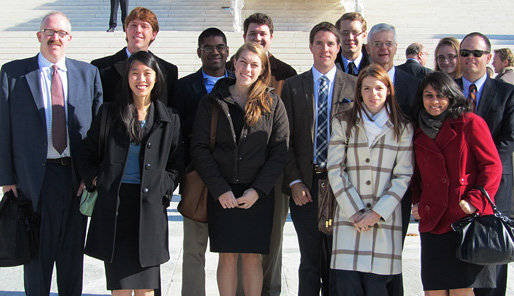The Supreme Court Litigation Clinic at the University of Virginia School of Law chalked a win in Rosemond v. United States on Wednesday, with the U.S. Supreme Court rejecting an appeals court’s affirmation of a federal firearms conviction in a drug trafficking case because the jury was not adequately instructed.
The 7-2 ruling marks the latest victory for the clinic, whose students prepared the opening petition and merits reply.
“The case pitted [the clinic] against the United States Solicitor General’s Office, colloquially known as ‘the best law firm in the country,’ which handles all the federal government’s cases before the Supreme Court,” Supreme Court Litigation Clinic Director Dan Ortiz said. “Our students did quite well against that awesome competition.”
Testimony during the criminal trial of Justus Cornelius Rosemond, the clinic’s client, could only identify him as a possible shooter in a 2007 Utah marijuana deal gone bad. Rosemond was convicted of discharging a firearm, or aiding and abetting the discharge of a firearm, during and in relation to a federal drug trafficking crime. Conviction on the count added 10 years to Rosemond’s sentence.
But this week’s Supreme Court decision, which vacated the previous judgment and remanded the case back to the U.S. Court of Appeals for the 10th Circuit, found that Rosemond’s jury needed to be informed about intent to facilitate or encourage the use of the gun by his confederate. Justice Elena Kagan wrote the opinion.
“The trial court’s jury instructions were erroneous because they failed to require that Rosemond knew in advance that one of his cohorts would be armed,” Kagan writes.
John P. Elwood, the Supreme Court Litigation Clinic instructor who argued the case, said the decision was great news for the clinic’s client, who could be eligible for release from prison soon depending on how the 10th Circuit resolves remaining issues.
“It was a very ‘hot bench’ at argument,” Elwood said. “The justices subjected our theories to very close scrutiny. But by the time I sat down, I was optimistic that we’d persuaded them that his conviction was invalid.”
Elwood said it’s common for the government to charge defendants with aiding and abetting, which carries a mandatory minimum in prison time. In Rosemond’s case, the firearms offense accounted for the bulk of his sentence – 120 of 168 months.
Ortiz said the case has been an important learning experience for the students who participated, both this year and last, because it pushed them to explore the “first principles” of criminal law.
“The issues of what one must do and what one must know or intend, to be guilty of aiding and abetting another’s commission of a crime, go to the very core of what criminal liability is all about,” Ortiz said. “I’m pretty sure the case will make it into the casebooks on federal criminal law.”
Third-year law student Andrew Kilberg was among this year’s students who worked with Elwood on the case’s merit reply in the fall.
“Working on a Supreme Court case as a law student was invigorating,” Kilberg said. “It is the kind of work that a lot of established appellate lawyers fight over, and we were lucky enough to have the experience as [third-year law students].”
Kilberg said he was impressed by how much trust the instructors had in the students.
“Dan and John critique our work product carefully, but they pretty much set us loose each week on an assignment, or several, and our input in and out of class sessions is taken seriously,” Kilberg said. “This experience has been and continues to be invaluable, especially as I plan to pursue an appellate practice in D.C. after clerking.”
The Rosemond case adds to the clinic’s strong track record in appearances before the Supreme Court. Since 2007, the clinic has won six of its 10 cases, with a seventh resulting in a split decision.
Media Contact
Article Information
March 7, 2014
/content/uva-supreme-court-litigation-clinic-students-top-best-law-firm-country

